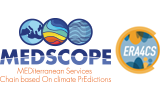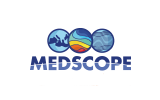From seasonal to decadal timescales: enhancing the exploitation of climate predictions
Skilful climate forecasts on seasonal-to-decadal timescales can have large socio-economic benefits. Seasonal predictions have therefore been performed operationally at centres around the world for more than 40 years. The skill of these predictions derives primarily from tropical phenomena such as the El Niño Southern Oscillation (ENSO), whereas predictability and forecast quality is currently relatively lower over Europe and the Mediterranean region (e.g. Weisheimer et al., 2011; Doblas-Reyes et al. 2013). There is also growing evidence that skilful climate prediction on multiannual (decadal) timescales may be possible, but while recent studies provide encouraging results, much work remains to be done to understand the potential predictability on these longer timescales (Meehl et al., 2014). In general, our limited understanding of the mechanisms and processes responsible for predictability and model systematic errors limit our capability to simulate and predict seasonal-to-decadal climate variability, especially over the Euro–Mediterranean area. Improved global climate model calibration and regionalization techniques as well as better forecast verification methods need to be developed for this region to extract as much climate information as possible from existing forecast systems. This is the primary and underpinning goal of MEDSCOPE, from which other user-oriented goals are derived and enabled, such as authoritative tailored climate information, tools for the creation of such information for a wider audience, and examples of the application of the tools in selected sectoral case studies of service development and demonstration of value.
MEDSCOPE is a three-year project that will enhance the exploitation of climate predictions from seasonal to decadal timescales, maximising the potential of their application in different economic sectors, public and private, of relevance for the Mediterranean region, here defined as the domain encompassing the Mediterranean basin and the surrounding areas, including North Africa and the Middle East.
MEDSCOPE will mainly focus on the seasonal timescale as a wealth of forecasts (including retrospective forecasts) is already available and, in general, the state-of-the-art of both scientific knowledge and applications are more mature for this case. However, the project will also provide an assessment of the predictability at longer (multiannual) timescales, an evaluation of the available decadal predictions and of their possible application in the region of interest.
The overall outcome of MEDSCOPE will be a set of tools and methods aimed at improving the production of climate services based on climate forecasts, enhancing the capability of public and private users and stakeholders to develop and implement strategies of adaptation to climate variability and climate change. Such tools will essentially be based on further development and refining of existing techniques and procedures, such as model output calibration (to tackle problems of systematic model errors), regionalisation (to enhance model resolution and therefore capability of representing small spatial scales) and mixed statistical-dynamical post-processing techniques (to address problems of specific sectoral applications intractable by standard prediction methods).
These ambitious results cannot be achieved without relying on the basis of an improved understanding of climate predictability mechanisms and processes in the target region. Improved process understanding is one example where pooling of expertise across the consortium institutions can be expected to deliver the best outcome and contribute to their integration. Furthermore, the consortium represents an opportunity of integration across climate sciences, sectoral applications and users, advancing climate services in the Mediterranean. In pursuing such goals, MEDSCOPE will therefore act as a community builder, giving rise to a powerful network of expertise, creation of which would be beyond the capability of the single institutions. The project will seek integration between scientists and users, including the private sector, through co-design and co-construction of the above common and shared methodologies, techniques, procedures and, ultimately, tools.
Evidence from past and current use of seasonal climate forecasts suggests that co-creation of knowledge in an iterative cycle between climate forecast providers, scientists in applied sectors and users is critical to the successful production of actionable science and usable climate services (e.g., Dilling and Lemos, 2011). The benefit of skilful climate forecasts will certainly depend on their performance, but not necessarily in a direct or even linear way. Stakeholders, scientists in applied sectors and climate modellers may give different climate variables different importance and may have different expectations. In addition, different users often have largely different capabilities of extracting useful information from forecasts of different skill. A key outcome of MEDSCOPE is to interact with final users in order to tailor climate forecasts and services to their needs, including quantifying skill and reliability to better meet stakeholder expectations. A dialogue will be initiated among forecast providers, users and stakeholders to identify key variables and level of user-dependent usable skill, facilitated through a limited set of demonstration cases. The interaction with users and stakeholders will be further favoured by the direct involvement of the partners of MEDSCOPE in the WMO-endorsed initiative MedCOF (Mediterranean Outlook Forum, including the associated SEECOF and PRESANORD). The strong and well-established link that the MedCOF has with a number of users and stakeholders operating in the Mediterranean region will guarantee a continuous and systematic co-creating dialogue between these potential users and the project.

